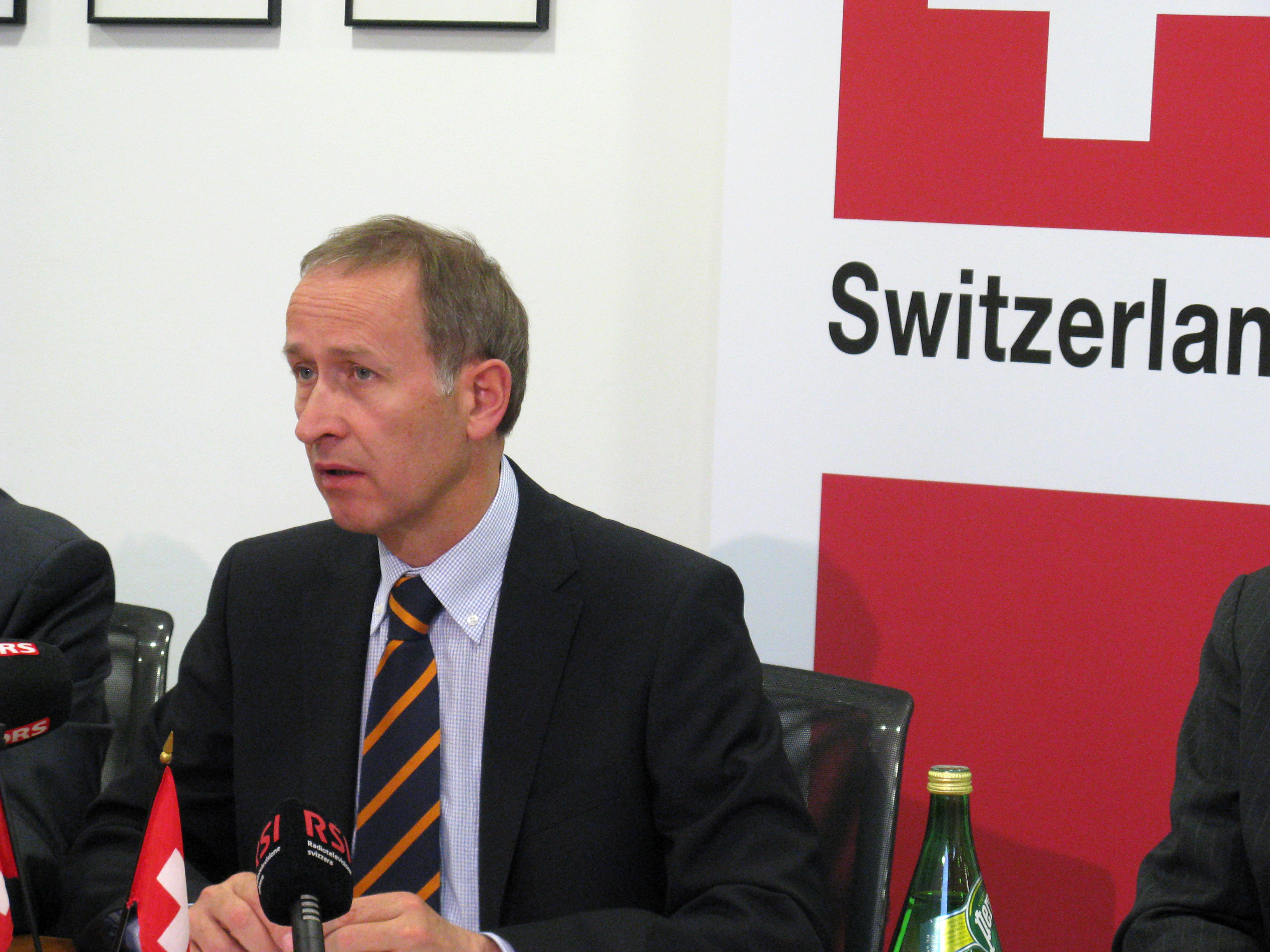Swiss delegation seeks influence in Washington

Representatives of the Swiss parliament have called on their American counterparts to reconsider one of the legislative consequences of the UBS bank scandal.
A parliamentary delegation led by senator Peter Briner was in Washington on a two-day visit, ending on Thursday, arranged by the Swiss-USA parliamentary association.
“Our main objective was to maintain strength to our relationship with our friends in Congress,” explained Briner, who said the group had been given a warm welcome by the American parliamentarians.
The delegation was received by several members of the US House of Representatives and Senate and their advisors. One of their meetings was with advisors of the powerful Republican deputy Spencer Bachus, who chairs the House Committee on Financial Services.
The Swiss visitors also met the members of the Friends of Switzerland Caucus, a group of Democrat and Republican deputies who have a personal or political interest in the development of relations with Switzerland, including Wally Herger, a Californian Republican with Swiss roots.
Anticipate problems
Markus Stadler, who won a seat in the Swiss senate for the new Green Liberal party in June, and who was on his first visit with the parliamentary association, said the main aim of the inter-parliamentary dialogue is to try to anticipate and resolve problems between Switzerland and the United States.
“Right now, we don’t have huge problems but I am convinced that, in order to have friends at a time of problems, you have to make those friends before problems happen,” Stadler told swissinfo.ch.
However, Switzerland and the United States have recently had a “big problem” in the shape of UBS – Switzerland’s biggest bank. Peter Briner maintains today that “it was IRS [Internal Revenue Service] versus UBS, not the US vs. Switzerland”.
But one of the consequences of the UBS scandal, on the IRS and US side, is the Foreign Account Tax Compliance Act, or FATCA.
This law, signed by Barack Obama last year, is due to come into force on December 31 2012. It attempts to apply to the areas of taxation and banking a principle of extraterritoriality of American law which is already used for certain aspects of the fight against terrorism.
FACTA requires non-American financial institutions with activities in the US to inform the US Revenue Service about accounts held with them by US citizens.
A counter-productive law
“It’s a counterproductive piece of legislation for the US because banks will find it too complicated and too expensive to do business in America,” Briner believes. He added that FACTA had dominated the discussions between his delegation and members of Congress.
“FATCA would force our banks to make agreements with the IRS and if agreements are not made, the US law would allow the US government to withhold a tax of 30 per cent on bank revenues,” Stadler explained.
He sees FACTA as an “inhibiting factor” in relations between the two countries.
But like Briner he came away with the impression that their message was understood by the other side.
“We made it very clear that not only we have interests but they have interests for themselves, they were listening to us and I guess we had a good impact,” Stadler said.
Impression of decline
Another consequence of the UBS affair, and the international debate about transparency in banking in general, was the signing by the US and Switzerland of a double taxation agreement conforming to the standards of the Organization for Economic Cooperation and Development. Strangely, the US has not yet ratified the agreement while the Swiss parliament did so in March 2010.
This dossier also lay at the heart of discussions the Swiss parliamentary delegation had with members of Congress. According to Stadler, the US side indicated that the agreement would be placed on the Senate’s agenda in the spring.
During his first visit to Washington as a senator, Stadler was struck by the effects of the economic crisis on the priorities of American decision makers.
“The members of the new Republican majority spoke about cutting the budget, cutting the budget and cutting the budget.”
He even had the feeling that the US sun is beginning to set.
“Thirty years ago, the US was the place to be, the center of the world but now, it seems to me that the old American dream is maybe not over, but is not the same way it used to be.”
Political colours. The members of the group included Peter Briner (Schaffhausen, Radical), Konrad Graber (Lucerne, Christian Democrat) and Markus Stadler (Uri, Green Liberal) from the Swiss Senate, and Kathy Riklin (Zurich, Christian Democrat), Ruedi Noser (Zurich, Radical), Walter Müller (Sankt Gallen, Radical) Remo Galli (Bern, Christian Democrat) and Paul Günter (Bern, Social Democrat) from the Swiss House of Representatives.
IMF The Swiss politicians had separate meeting with the leaders of the International Monetary Fund (IMF) and with the advisors of three American senators, including the chairman of the US House Committee on Financial Services.
Caucus. The Swiss visitors met members of the parliamentary group Friends of Switzerland at the House of Representatives, including the Democrat Tammy Baldwin and her Republican colleague Wally Herger, co-presidents of this caucus.
In 2008, UBS – then the world’s largest wealth manager – was caught in an IRS sting that used information from a former employee to build a case that the bank has helped US citizens to evade taxes.
In February 2009, UBS admitted its guilt and was forced to pay a $780 million fine and hand over the names of some 285 clients. Trials and convictions followed this list of names being handed on to the IRS.
However, an IRS demand for 52,000 more names escalated the case into a diplomatic and political saga.
In August 2009, the Swiss and US governments agreed to a deal that would hand over the confidential details of 4,450 UBS clients.
But a Swiss federal administrative court ruling in January 2010 that the handover of the original 285 names was illegal, left the deal in doubt.
Such doubts were finally dispelled in June 2010 when the Swiss parliament voted to allow the 4,450 names to be handed over to the US authorities. These names will be processed in batches before being passed on to the IRS in phases.
UBS has ended all cross border wealth management services for US clients but still retains an onshore wealth management presence in the US.
(Translated from French by Clare O’Dea)

In compliance with the JTI standards
More: SWI swissinfo.ch certified by the Journalism Trust Initiative












You can find an overview of ongoing debates with our journalists here . Please join us!
If you want to start a conversation about a topic raised in this article or want to report factual errors, email us at english@swissinfo.ch.